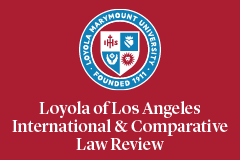Abstract
Israel is no stranger to the scorn of the international community. In many respects, Israel is held to a different standard than other nations. In July 2018, that hypothesis was tested when Israel’s Knesset passed The Basic Law: Israel – The Nation State of the Jewish People. Though largely symbolic, the Law declares, inter alia, “[t]he exercise of the right to national self-determination in the State of Israel is unique to the Jewish People.” Critics lambasted the clause for allegedly violating international law by rejecting non-Jews’ right to exercise self-determination in the State of Israel. This note argues that the clause complies with international law because the Palestinians’ right to national self-determination is linked to a future Palestinian state. The British Mandate, the Partition Plan, and international law have all recognized Israel as the homeland of the Jewish people, where Jews exercise their exclusive right to national self-determination. Palestinians and other non-Jews, like minority populations in other nations, may exercise the right to internal, not national, self-determination in the State of Israel. Yet still, to the Law’s critics, its passage marked the official downfall of Israeli democracy, which begs the question: why is Israel challenged when it seeks to join the host of nations who have similar nationhood provisions? Is Israel, as a sovereign nation, not entitled to the same privileges or proclamations of nationhood?
Recommended Citation
Daniel Bral,
Israeli Exception-alism: The Nation-State Law and its Place in the Israeli Geopolitical Zeitgeist,
43 Loy. L.A. Int'l & Comp. L. Rev. 1
(2019).
Available at: https://digitalcommons.lmu.edu/ilr/vol43/iss1/1
Included in
Conflict of Laws Commons, International Law Commons, Law and Philosophy Commons, Law and Politics Commons, Law and Race Commons, Law and Society Commons, Legal History Commons, Other Law Commons, Public Law and Legal Theory Commons, Rule of Law Commons


